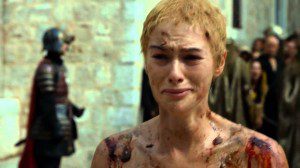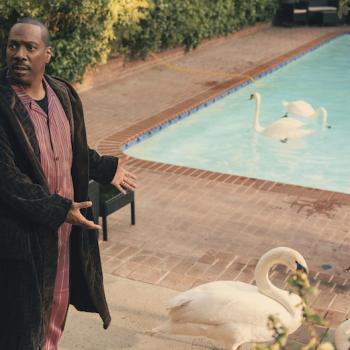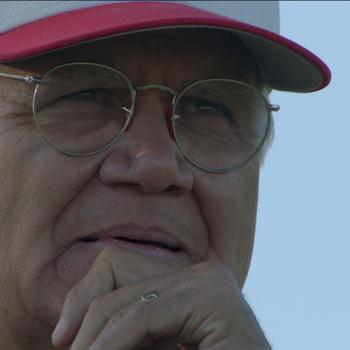 Game of Thrones concluded its fifth season with, as it always does, a lot of traumatic death. Characters dropped like clothes in a Miley Cyrus video, and The Atlantic called the finale a “Bleakness Binge.” I suspect that being a fan of the HBO show may feel a tiny bit like an abusive relationship: It punches you in the gut. It makes you cry. It betrays you every year. And still you come back, hoping (but not really believing) that this time, this season, will be different.
Game of Thrones concluded its fifth season with, as it always does, a lot of traumatic death. Characters dropped like clothes in a Miley Cyrus video, and The Atlantic called the finale a “Bleakness Binge.” I suspect that being a fan of the HBO show may feel a tiny bit like an abusive relationship: It punches you in the gut. It makes you cry. It betrays you every year. And still you come back, hoping (but not really believing) that this time, this season, will be different.
Even with the dead piling up like so much February snow, perhaps the hardest scene to watch was Cersei Lannister’s Walk of Shame. After confessing to (a small portion of) her sins, she’s forced to slice off her beautiful blond hair and walk through the streets of King’s Landing naked—her subjects jeering her, pelting her with filth as she takes each step.
I’m not a Game of Thrones fan. It is as tawdry, salacious show as there is, frosting its bleak and amoral worldview with graphic, utterly gratuitous nudity. (The show’s penchant for throwing naked bodies into scene-setting dialogue helped coin a new term: sexposition.) And in some ways, Cersei’s march through King’s Landing was the show in microcosm—a horrific scene filled with nudity, abuse and loads of flying trash.
But the scene was pretty interesting, too. Here, for once, was an instance where nudity was not used in Thrones to titillate, but to stress Cersei’s vulnerability and humanity. Her hair being shorn shares echoes with Sampson: Both derived power from their hair—he strength, she beauty. Through four books and five seasons, Cersei has done her best to separate herself from the masses, acting almost like a goddess living among mortals. Her humiliating walk revealed her mortality to the kingdom. Her suffering felt real.
And in a twisted way, it reminded me of Jesus’ own painful, humiliating walk through the streets of Jerusalem on the way to his crucifixion.
 Cersei is no Christ figure. Those familiar with the books or show know that she’s a terrible human being. The sins for which she was punished only scratch the surface of her long list of crimes. Most regular viewers or readers, I’d imagine, hope that the Queen Regent will meet, in the end, some terminal justice.
Cersei is no Christ figure. Those familiar with the books or show know that she’s a terrible human being. The sins for which she was punished only scratch the surface of her long list of crimes. Most regular viewers or readers, I’d imagine, hope that the Queen Regent will meet, in the end, some terminal justice.
But the humiliation that Cersei suffered during her Walk of Shame seemed, somehow, worse than death.
“They’re trying to shame her,” Game of Thrones showrunner David Benioff told Entertainment Weekly. “They’re trying to humiliate her as much as they possibly can. It’s supposed to be like a scene from a nightmare.”
Lena Headey, who plays Cersei, said, “I can’t even imagine people wanting your blood. Cersei has done wrong, but she doesn’t really deserve this.”
She doesn’t really deserve this. If anyone deserves such humiliation, it would be Cersei. Yet how many people rooting for Cersei to suffer an ignominious death long for her to be rescued from this walk of humiliation? And how much more unfair is it that Jesus—who was literally without sin—suffered through His own humiliating Walk of Shame?
Cersei may have imagined herself a goddess, but Jesus really was God. And yet He was mocked. Jeered. Humiliated in every conceivable way. Jewish law required that He be stripped naked before being crucified. The whole experience was meant to shame Christ—and to definitively reveal to Jerusalem that He was no king, no God. He was a man. And as a man, He would surely die.
Much attention is paid to Jesus’ physical torture and death, and I get that. But I sometimes forget just how painful the walk must’ve been on an emotional level, too—something of which Cersei’s scene helped remind me. Jesus didn’t just suffer physically. He was humiliated. I think the Bible wants us to understand Jesus’ humiliation, to feel how He was mocked and jeered, to fully grasp His humanity in order to more fully marvel at His divinity. The Bible revels in the paradox.
Jesus suffered through the humiliations of Cersei and much, much more—and blamelessly so—for us.













